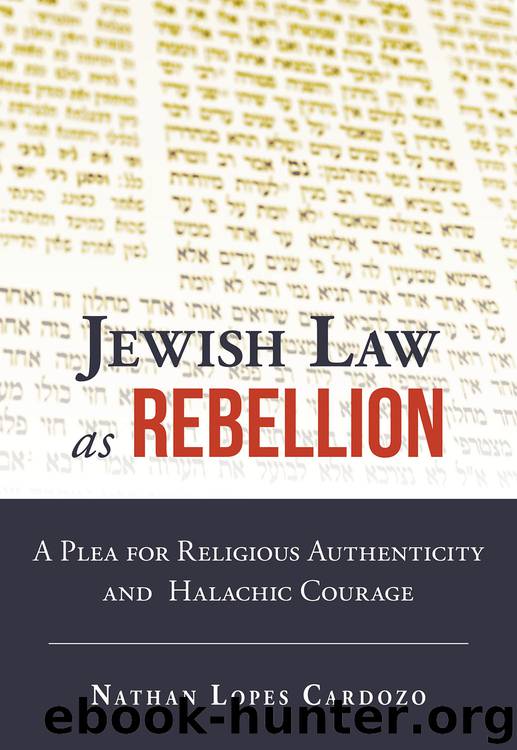Jewish Law as Rebellion by Lopes Cardozo Nathan

Author:Lopes Cardozo, Nathan
Language: eng
Format: epub
Publisher: Urim Publications
Published: 2019-04-07T16:00:00+00:00
* * *
1. Mishna Chagiga 2:1.
2. See Maharsha, Chiddushei Aggadot on Chagiga 11b, s.v. “ba-arayot.”
3. Vayikra 18:9, 18.
4. See Shulchan Aruch, Even ha-Ezer 1:9-10.
5. Vayikra 18:12–13.
6. Moreh Nevuchim, part 3, chap. 8.
7. See Julia Watkin, “The Logic of Søren Kierkegaard’s Misogyny 1854-1855,” Kierkegaardiana 15 (1991): 82–92.
Chapter 27
On the Law of the Mamzer
Between Fairness and Holiness in Halacha:
Possible Solutions and Rabbinical Courage
(The Theology of the Halachic Loophole
and the Meaning of Torah From Heaven)
Introduction
“A mamzer shall not enter into the congregation of the Lord.”1
It is generally assumed that Jewish Law is morally sound. There is one law that, on the face of it, runs counter to this assumption.
The Halacha states that a mamzer2 is prevented from marrying a fellow Jew or Jewess. Only fellow mamzerim or proselytes are potential candidates to be this person’s partner in life.3 According to rabbinic definition, a mamzer is a child born from a couple whose sexual relationship is forbidden according to the Torah and punishable by karet, or the death penalty.4 Because of this, a marriage between them is void. Thus, for example, the child born of a union between brother and sister, or between a woman legitimately married to a man and having a child with another (Jewish) man, is a mamzer.5 Even more problematic is the fact that all offspring of a mamzer are also mamzerim even if the mamzer marries a proselyte. This law applies ad infinitum.6 Interesting enough is the fact that if there was an adulterous relationship with a non-Jew, the child is not a mamzer.7 The law applies equally to both male and female, the latter referred to as a mamzeret.8
While recognizing the inherent wrong in these liaisons and the social damage caused thereby, one may be forgiven for wondering how the Torah could introduce a law so apparently unjustifiable and inhumane: that a child pay the price for the misdeeds of its parents. This would appear, in fact, to contradict another basic Torah principle, namely, that each person is responsible only for his or her own actions,9 or for those of a fellow Jew when one is in a position to prevent a particular transgression. However, in this case the unborn child is already condemned for life, before he or she could do anything right or wrong!
Ethically, there seems to be no way to justify this biblical ruling, and therefore one might perhaps argue that it should be seen as purely theoretical. This, for example, is the case with the law concerning the ben sorer u-moreh, the rebellious son.10 The sages declared that the conditions for passing a death sentence in such a case were so stringent and far-fetched that they could never be met; rather, the case was only stated to increase the reward for those who study this verse as part of the mitzva of Talmud Torah, and to learn moral lessons from the philosophy behind this law.11
Why then do the rabbis, or for that matter the Oral Tradition, not
Download
This site does not store any files on its server. We only index and link to content provided by other sites. Please contact the content providers to delete copyright contents if any and email us, we'll remove relevant links or contents immediately.
| Hebrew Bible (Old Testament) | Talmud |
| Torah | Zohar |
Man's Search for Meaning by Viktor E. Frankl(2254)
The Secret Power of Speaking God's Word by Joyce Meyer(2252)
Mckeown, Greg - Essentialism: The Disciplined Pursuit of Less by Mckeown Greg(2111)
MOSES THE EGYPTIAN by Jan Assmann(1970)
Unbound by Arlene Stein(1939)
Devil, The by Almond Philip C(1899)
The Complete Dead Sea Scrolls in English (7th Edition) (Penguin Classics) by Geza Vermes(1839)
I Capture the Castle by Dodie Smith(1570)
Schindler's Ark by Thomas Keneally(1513)
The Invisible Wall by Harry Bernstein(1458)
The Gnostic Gospel of St. Thomas by Tau Malachi(1412)
The Bible Doesn't Say That by Dr. Joel M. Hoffman(1372)
The Secret Doctrine of the Kabbalah by Leonora Leet(1265)
The Jewish State by Theodor Herzl(1251)
The Book of Separation by Tova Mirvis(1224)
A History of the Jews by Max I. Dimont(1206)
The Dead Sea Scrolls Bible by Martin G. Abegg(1199)
Political Theology by Carl Schmitt(1186)
Oy!: The Ultimate Book of Jewish Jokes by David Minkoff(1103)
